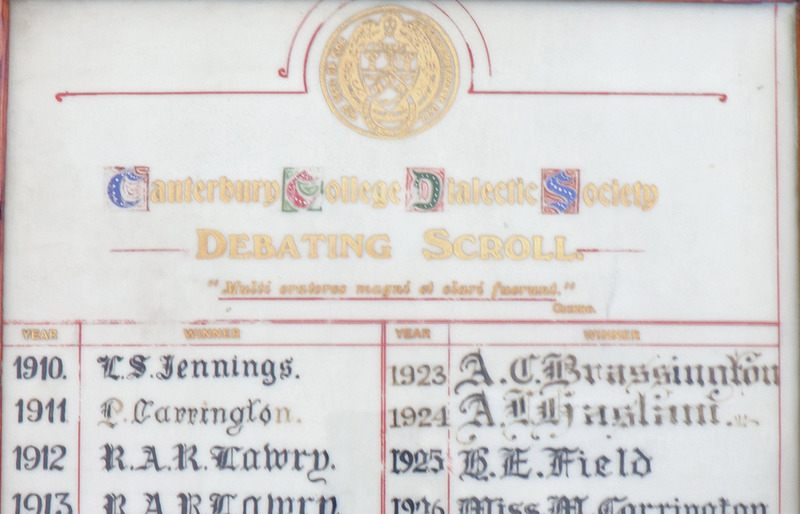Alan Brassington
This frame holds the Debating Scroll that was the award for the Canterbury College Dialectic Society’s annual debating competition held between 1910-1935. The winner in 1923 was A.C. Brassington, and we can be almost certain that this was Alan Claudius Brassington.
Alan Brassington graduated from Canterbury College, now the University of Canterbury, with a law degree in 1925. He became a lecturer in Law at Canterbury College in 1928, a position he held until his resignation in 1951. This made him the longest serving lecturer at the Law School in the first 100 years of its existence. He was also an assistant lecturer in constitutional history from 1932-39. To his students, he was affectionately known as ‘Brasso’ and put great emphasis on Law as an academic discipline as well as a professional qualification. He is credited with being the founding member of the Law Students’ Society at the University, and served as their first secretary in 1923. Brassington continued to support their work throughout his time at the University. He was admitted to the roll of Barristers and Solicitors of the High Court of New Zealand in 1923 and practiced constitutional law for many years in Christchurch until his retirement.
In addition to his influence in law and the University, Alan Brassington and his family have long been associated with the Canterbury Museum. His grandfather, William Brassington, was a stone mason and had a significant contribution to the stone buildings in Christchurch, more specifically, the Provincial Chambers, Lyttelton Timeball Station and the Museum. His father, Claudius Brassington, was also an accomplished stone-mason and sculptor having studied at Canterbury College School of Art. He also worked in the construction of the Museum and personally carved the inscription over the entrance in 1896. Claudius Brassington was a member of the Society of Friends of the Museum; Alan later became a member of the same Society. He was chairman of the Society of Friends of the Museum and was elected to represent them on the Canterbury Museum Trust Board.
The scroll Brassington won in 1923 was awarded by Canterbury College’s Dialectic Society. The Dialectic Society was founded in the early years of the College at the suggestion of John Macmillan Brown to form a debating society. It began as a Society to host debates, essays and lectures but it soon expanded to include music, drama, essay readings and social events called Olla Podrida. When the society was officially established in 1879, they wrote a constitution which stated ‘That its object be to promote the fellowship and mental culture of the student’. Being involved with the Dialectic Society would have likely instilled certain ideals within the members that could have encouraged them to be involved within their communities. It is possible that Brassington was inspired by the Dialectic Society to create the Law Society in 1923. He experienced first-hand the positive impact a strong society could have on its members and the support it provides.
The Dialectic Society hosting an annual debate competition would have helped foster the ideals of their members. Brassington went on to have significant impact in his community and within his field, and it is not without credit to the Dialectic Society for fostering this sense of confidence and community within him.


